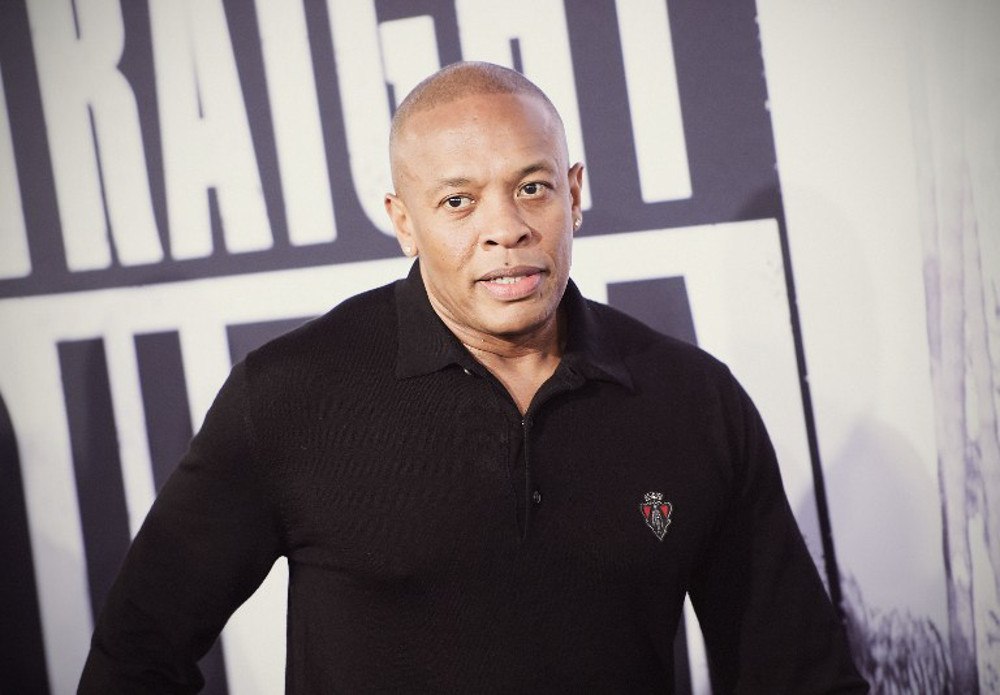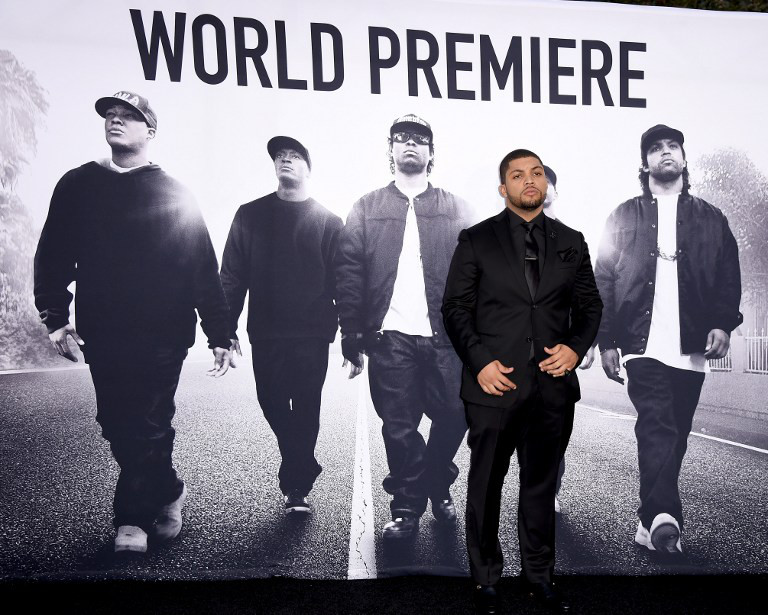At the (very brief) height of their powers, the rap crew NWA were labelled “the most dangerous group in the world”. They united liberal left and reactionary right in disgust at their works and were considered worthy of the unfriendly, and very public, attentions of America’s security services. A quarter of a century later – with a new biopic about their phosphorescent impact on popular culture about to be released and an imminent induction into the Rock’n’Roll Hall of Fame – NWA are completing an unlikely transition from controversy and harassment to acceptance and acclaim.
Formed from the bits and pieces of other Los Angeles groups and financed by the drug profits of one of their members (Eric “Eazy-E” Wright), NWA were, in retrospect, always going to be trouble. Their name alone told you that. Even as cocksure a bunch as Eazy and his cohorts Dr Dre, Ice Cube, DJ Yella and MC Ren must have known they’d never get away with Niggaz Wit Attitude (the quintet’s full moniker), so they settled on the initials. It didn’t matter. The inevitable questions about those three capital letters meant that the message got through loud and clear.
The late 1980s rap world they entered was dominated by acts from the US’s eastern seaboard and by groups brilliantly espousing assorted brands of virtuousness and positivity. In the autumn of 1988, Public Enemy released their magnificent It Takes a Nation of Millions to Hold us Back, a flaming torch of righteous indignation. The following spring, De La Soul unfurled their trippy masterpiece, Three Feet High and Rising, a lyrical firework display of childlike wonder. In the summer of 1989, hip-hop was East Coast, right-on and increasingly respectable. NWA’s first album blew all that to smithereens.
Straight Outta Compton was, and remains, extraordinary, right from the first second. A record otherwise characterised by howling waves of noise and lyrical vitriol, it begins with a stunning moment of quiet certainty as a single voice announces: “You are about to witness the power of street knowledge.” The three songs that follow are perhaps the most powerful opening salvo in music, a roaring cascade of youthful rage, all spat out in a black, urban slang previously hidden from most of the world.
The title track introduces the band members in a welter of profanity, braggadocio and middle-finger-raised political incorrectness. Fuck tha Police follows, its shockingly explicit description of the treatment of young black males by the LAPD a disturbing snapshot of life just down the road from Hollywood, and a chilling prophecy of the Rodney King beatings and the subsequent riots a few years later.

Dr Dre. (AFP)
Today, protesters in the streets of Ferguson, Missouri, wear Fuck tha Police T-shirts. The third bullet fired into the heart of the status quo is Gangsta Gangsta. Utterly unapologetic in its brutal portrayal of street life in the LA suburbs of Compton, Watts and South Central, it casually unveils a universe of drugs, firearms and no-ties sex.
All of this is heightened by the music. Where Public Enemy had crafted soundscapes that were echoes of the dysfunctional housing projects, NWA’s record is marbled with real gunshots, sirens and screams. The effect is disorienting, caught somewhere between a cartoon and a madly heightened reality, the authenticity of which the majority of listeners and critics were in no position to confirm or deny.
Despite a total lack of radio support, the record sold well, if not spectacularly; it took four years to pass one million copies. But, like the first albums by the Velvet Underground and the Sex Pistols, Straight Outta Compton‘s success is more usefully measured by its influence, by the things it changed and set in train, than by the units it shifted.
NWA established the US’s West Coast as a vibrant centre of hip-hop production, setting up a rivalry with the music’s old East Coast stronghold that would ultimately result in the killing of two of the music’s biggest stars, 2Pac and the Notorious BIG. Equally, the lyrical concerns and largely apolitical, amoral stance of the music set the blueprint for the musical style that would dominate the US charts for the next decade.
NWA didn’t invent gangsta rap (they’d picked up on themes previously iterated in, among others, Schoolly D’s Saturday Night and Ice-T’s 6 in the Mornin’) but they did send it spinning into the mainstream, opening artistic and commercial doors for a stampede of less talented fellow travellers and wannabes.
They even changed the way rap looked. Black jeans were topped by the colours of LA’s ice-hockey team, the Kings, and the city’s football franchise, the Raiders; both predominantly wore black. The Raiders were a particularly apt symbol for rebellious youth, habitually employing the ne’er-do-wells, mischief-makers and head-bangers other sports clubs eschewed. The black and silver Raiders’ baseball caps and bomber jackets have remained a large part of rap fans’ wardrobes for the past 25 years. Indeed, people who have never heard of NWA wear them without having the faintest idea why; the Raiders cap has become the hip-hop equivalent of rock’s ubiquitous Ramones T-shirt.

Actor O’Shea Jackson Jr at the premiere of Straight Outta Compton in LA. (AFP)
The band were not able to enjoy the fame (or notoriety) that followed their debut release. The things they said, and the way they said them, saw them engulfed by criticism and opprobrium. Conservatives feared them as radicals. Liberals despised the perceived misogyny, homophobia and nihilism of their lyrics. Black activist groups thought they painted negative portraits of African-American masculinity. And in interview after interview they were forced to defend the charge that they glorified violence.
The drama was also playing itself out in the pages of the then powerful British music press. Looking back, it now seems incredible just how much kerfuffle the arrival of hip-hop caused and how vehement the arguments became. I was assistant editor, and then editor, of NME, the best-selling weekly, at the time; I remember going to Long Island to interview Public Enemy for a cover piece just as Nation of Millions was breaking big. When I got back, I wrote the cover headline “Public Enemy: The Greatest Rock’n’roll Band in the World!?!” The debate that followed – about whether hip-hop was real music, never mind rock’n’roll, about the fact that they’d used the word “bitch” in the title of one of their songs, about every last detail – went on (in the office, in the paper, on the letters page) for months.
NWA’s world view, vocabulary and apparent disregard for what anyone else thought meant that they divided opinion even more fiercely. For my colleague the late Steven Wells aka Seething Wells (ranting poet, funny man and card-carrying leftie firebrand), they were manna from heaven, just the kind of freebooting insurgents who were sure to destroy the running dogs and lackies of the west.
After much nagging, he was sent to LA to meet the band, and no doubt help co-ordinate the downfall of capitalism. He returned puce with anger, pickling in his own disappointment. Far from sharing his revolutionary zeal, it turned out that the boys from the ‘hood were planning to buy large utility vehicles and gaudy cribs in comfortable suburbs. Ice Cube, indeed, had already made the move and – class criminal! – had ornamental ducks on his front lawn. Steve’s piece was pretty negative, but the ding-dong over the headline (his idea, unrepeatable here, would have had the paper closed) went on for several extremely late nights.
Arguments about cultural differences, cultural imperialism, race, freedom of speech, the political power of language, the place of music and the meaning of lawn ducks week after week, month after month, the table-slamming about hip-hop and rap went on, all to the soundtrack of some of the most exciting music I’d ever heard. It was a great time to be at that table. For NWA, though, this culminated in the US’s law enforcers and security services getting involved. At the centre of the new film (also called Straight Outta Compton) is the 18-month face-off with the authorities that led to the harassment and arrest of the band members and their management.

An image from biopic Straight Outta Compton.
Concerts were routinely cancelled for reasons of public decency; when they did go ahead, they did so under the watchful eye of the police. At a gig in Chicago, officers rushed the stage to prevent them playing Fuck tha Police. It seems surreal now but Milt Ahlerich, the FBI’s assistant director, found time in his schedule to write the band a stern letter expressing the bureau’s deep concern about their activities.
The pressure told. The quintet – part of whose appeal was that they appeared to be part of some kind of brotherhood, however unchivalrous – began to fall out with one another. Ice Cube, the group’s most erudite spokesperson, departed. The second and final album, Efil4Zaggin, (Niggaz4Life) sounds good, Dr Dre further honing the swaggering mid-tempo groove that came to be called G-funk. But the record was blighted by lyrics that crossed the line between the forcefully expressed, if often unpalatable ideas of Straight Outta Compton, and puerile, genuinely offensive controversy for its own sake.
The record sold by the barrowload – particularly to white suburban kids desperate to clamber aboard gangsta rap’s chrome-wheeled bandwagon – but nobody plays it much today.
The split, soon after, was inevitable; too much energy had been expended in dealing with the reaction to what they’d created. Eazy-E died of an Aids-related illness in 1995, aged just 31. The lives and careers of the rest of the band are an illustration of just how accepting the mainstream can be of artists once thought to be beyond the pale. MC Ren and DJ Yella have continued to make music, and the latter has directed, by his own count, more than 300 adult films.
Dr Dre is a towering figure of modern music, having driven the careers of, among others, Snoop Dogg, Eminem and 50 Cent. He’s phenomenally wealthy. In 2001, he sold his share of the Interscope record company for more than $50-million, but even that was rendered chicken feed when Apple recently bought his headphones company, Beats, for $3-billion – a deal described by Forbes magazine as “the single biggest payday of any musician in history”.
Ice Cube has turned to film production and acting – in increasingly poor movies. It’s a shocking moment (a bit like watching Johnny Rotten selling you margarine on TV), when watching Anaconda, you realise that the man being regurgitated by the giant snake was once a scourge of the establishment and a threat to American national security. – © Guardian News & Media 2015